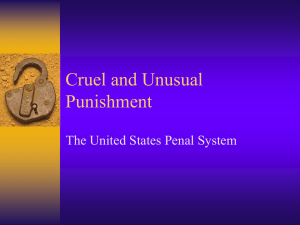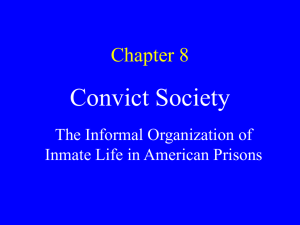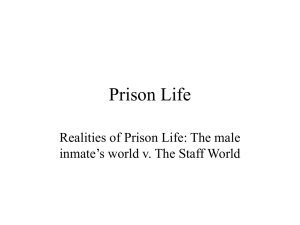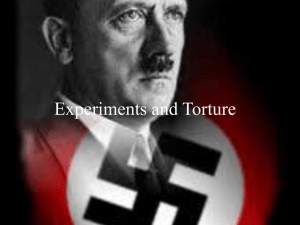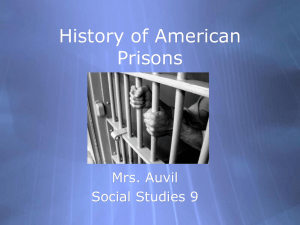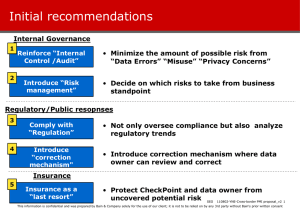File
advertisement
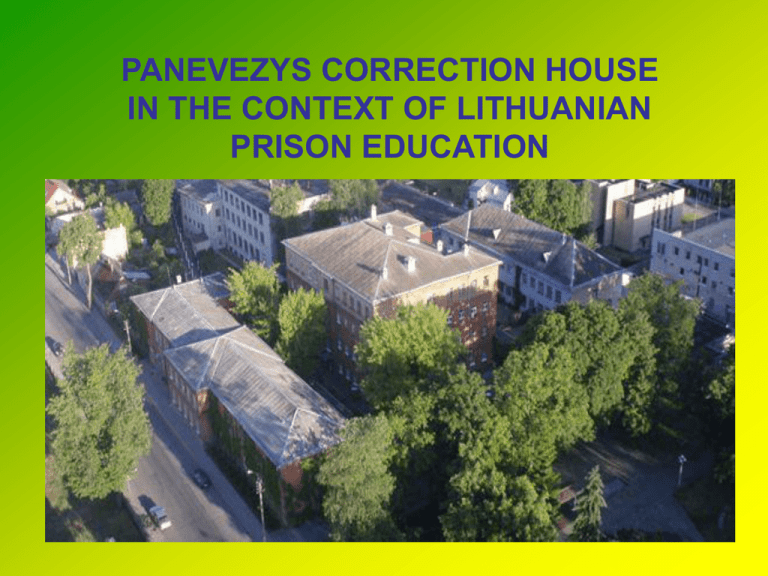
PANEVEZYS CORRECTION HOUSE IN THE CONTEXT OF LITHUANIAN PRISON EDUCATION EDUCATION: ITS ROLE IN THE PRISON SYSTEM • In any country, the penitentiary system is a highly socially sensitive problem. • Work on the quality of the personalities of the inmates might really change the situation. • The desirable result can be achieved only on condition that a whole spectrum of penitentiary measures is applied while in prison, and this is where education plays an essential role. PRISON EDUCATION: LEGISLATION • According to the European Prison Rules approved on 12 February 1987 by the Committee of Ministers of the Council of Europe Recommendation No. R (87) 3, one of the main objectives of a penitentiary system is “to provide opportunities for all prisoners to pursue at least some of their individual needs and aspirations, to improve the prospects for their successful social resettlement, the morale and attitudes of prisoners and their self-respect.” • These provisions of the European Prison Rules underlie the legal basis of the penitentiary system of post-independence Lithuania. The legal status of a sentenced person (that is, his/her rights, freedoms and duties) is determined by the Penal Enforcement Code and other laws as the standards of the Council of Europe provide. PANEVEZYS CORRECTION HOUSE: BACKGROUND INFORMATION The Panevezys Correction House is the only of Lithuania’s 11 penal institutions enforcing custodial sentences imposed on female offenders. PANEVEZYS CORRECTION HOUSE: BACKGROUND INFORMATION Currently all women and underage girls convicted in Lithuania (with the only exception of life sentence prisoners) serve their sentences at the Panevezys Correction House irrespective of their previous convictions, severity of the crime committed, regime or other criteria. EDUCATIONAL BACKGROUND OF THE INMATES Distribution of convicts by educational background (1 January 2012) Convicted persons Higher (university/college) education Total across Lithuanian penitentiary system Panevezys Correction House 2% 3% Vocational education 6% 8% Secondary education 34% 41% Basic school education 39% 33% Primary education 18% 9% No education 1% 6% EDUCATIONAL BACKGROUND OF THE INMATES • The year 2011 was marked a positive tendency across Lithuania’s penitentiary institutions defined in terms of a stop in the decline of the education level of convicts, with the tendency dynamics actually reversing. • It is hard to predict whether this tendency will persist, but what is clear is that at least one in five convicted persons should be encouraged to improve their level of formal education. SECONDARY EDUCATION: LEGISLATION • Inmates under 16 years of age are obliged to attend secondary school. • Older prisoners have the option of further education. • The ambition of an inmate to seek education is encouraged with various incentives and privileges. SECONDARY EDUCATION: PRISON SYSTEM • At present, 10 out of Lithuania’s 11 penitentiary institutions have functioning secondary schools. • In 2011, the proportion of inmates attending secondary school was 16%, (by comparison, 21% of inmates at the Panevezys Correction House attended its secondary school). • In 2011, 4% of total number of prisoners (2 % at the Panevezys Correction House) completed basic or secondary education. • The inmates’ education certification documents are the same as those acquired at regular community schools. SECONDARY EDUCATION: PANEVEZYS ADULT SECONDARY SCHOOL Educational programmes: • primary (length of course: 4 years, grades 1 to 4); • basic (length of course: 6 years, grades 5 to 10); • secondary (length of course: 2 years, grades 11 to 12). Distinctive features of the school: • fluctuations in inmate population; • an unconventional primary class (inmates of Romany descent); • a lot of students of different ages in the same class. Unusual situation: • mother and daughter study on the same programme and in the same class. VOCATIONAL TRAINING: LEGISLATION • Recommendation of the European Prison Rule No. 71 says: “Prison work should be seen as a positive element in treatment, training and institutional management.” • This recommendation is followed in the Penal Enforcement Code of the Republic of Lithuania, and vocational training is considered amongst the priorities of social rehabilitation. VOCATIONAL TRAINING: PRISON SYSTEM • At present 7 (out of 11) penitentiary institutions provide vocational training at community vocational school branch offices functioning within the penitentiary institutions. • In 2011, 15% of the total number of prisoners attended those schools. • The correction houses provide vocational training in the most desired professions, including the training of dressmakers, cooks, carpenters, garage mechanics, welders and hairdressers. • Inmates are presented with a list from which they choose the profession they prefer to be trained in. • In 2011, 13% of the total number of prisoners have graduated from vocational training schools, acquiring a profession and receiving a graduation certificate identical to that of any other vocational school graduate. VOCATIONAL TRAINING: PANEVEZYS CORRECTION HOUSE • The inmates of the Panevezys Correction House are very eager to undergo vocational training. • Last year as many as 37% of inmates have been trained, and 31% graduated with qualifications in dressmaking, cooking, hairdressing and carpentry. THE MAIN PROBLEMS OF PRISON EDUCATION • The inmates lack the motivation to continue with their education or improve their qualifications. Besides, Lithuanian legislation provides for only a limited payment for work, but not for learning. • As the school year is approximately 9 months, prisoners sentenced to shorter terms of imprisonment are unable to finish their training. • The inmates’ frequent departures to court or hospital get in the way of training and the planning of the teachers’ work. WORK OPPORTUNITIES: PRISON SYSTEM • As they serve their terms, the inmates may also acquire vocational skills by working for state enterprises under the Prison Department operating at three penal institutions. • The enterprises specialise in the production of furniture, electric fittings, different metal mouldings, door and window accessories. They also make bedclothes, coveralls, footwear and repair vehicles. • The goods manufactured by inmates are identical in quality to those produced by regular enterprises, but they are less expensive in the majority of cases. WORK OPPORTUNITIES: PANEVEZYS CORRECTION HOUSE • The state enterprise currently operating at the Panevezys Correction House specialises in the production of bed linen, sewing, amber works and the assembly of bicycles and bicycle wheels. In 2011 this enterprise employed an average of 54 inmates. • The inmates also have the opportunity of working for the prison’s housekeeping unit as cleaners, site maintenance workers, paramedical staff or auxiliary staff. Although the housekeeping unit has 26 staff positions, in an effort to maximise the involvement of inmates in it, it employs 50 inmates on a part-time basis. WORK OPPORTUNITIES: OUTSIDE PRISON • The Penal Enforcement Code provides for a possibility for inmates who meet certain legal requirements to leave the territory of the penitentiary facility without supervision. This provision gives the inmates the opportunity to work outside prison. • Inmates of the Panevezys Correction House thus work for a waste sorting facility, a homeless animal shelter, and in the autumn they are employed as apple pickers at farm. An average of 10 to 15 inmates are employed outside prison at any one time. INFORMAL EDUCATION: PANEVEZYS CORRECTION HOUSE The Panevezys Correction House has an active programme of informal education, aiming to create the optimum conditions for the inmates’ informal and selfeducation. • We have two libraries used by 90% of the inmates. • The holdings of the two libraries amount to 5,000 titles, including 3,856 books of fiction. INFORMAL EDUCATION: SOCIAL REHABILITATION PROGRAMMES Compulsory social rehabilitation programmes: • The Adaptation Programme aims at helping inmates first arriving at the Correction House integrate in a new social environment and engage in a successful correctional process. • The Social Integration Programme aims at assisting the inmates with integrating in society after their release from the Correction House, minimising as far as possible the prospect of re-offence. This programme has at its focus the development of the inmates’ socially valuable skills as well as their legal and social education. INFORMAL EDUCATION: SOCIO-EDUCATIONAL WORK In addition to compulsory social rehabilitation, the Panevezys Correction House runs over 20 different training, educational, correctional and psychological programmes, engaging about 95% of all inmates. INFORMAL EDUCATION: SOCIO-EDUCATIONAL WORK Amongst the most important programmes are the following: • The inmates’ physical education programme entitled ‘Healthy Body’; • A programme entitled ‘Meet the Computer’, teaching the inmates the basics of computer literacy; • A programme for the development of underage inmates’ social skills; INFORMAL EDUCATION: SOCIO-EDUCATIONAL WORK • A rehabilitation programme designed to treat psychoactive substance addictions; • A programme entitled ‘Fine Handiwork’, aimed at developing the inmates’ creative potential; INFORMAL EDUCATION: SOCIO-EDUCATIONAL WORK • ‘Aggression and Conflict Management’ programme; • Stress management programme; • A ten-month programme entitled ‘Towards Bodily and Spiritual Harmony’, developed in cooperation of the Family Centre of the Panevezys Diocese, teaching religion and lessons of maternal skills to mothers and holding physiotherapy sessions; • A number of programmes for the development of spiritual, Christian or universal values run with the help of clerics of different confessions. ON THE LOOKOUT FOR OPPORTUNITIES TO PARTICIPATE IN THE PROJECTS • The Panevezys Correction House has on several occasions partnered on projects aimed at the inmates’ formal and informal education and training, as well as those designed to increase the inmates’ occupation with work. • In an effort to provide better education and vocational training opportunities or other forms of meaningful engagement to its community of inmates, the Panevezys Correction House is on the lookout for more opportunities of participation in programs and projects supported by international organisations. • We would like to extend a warm invite to everyone wishing to collaborate with us in such activity. THANK YOU!
